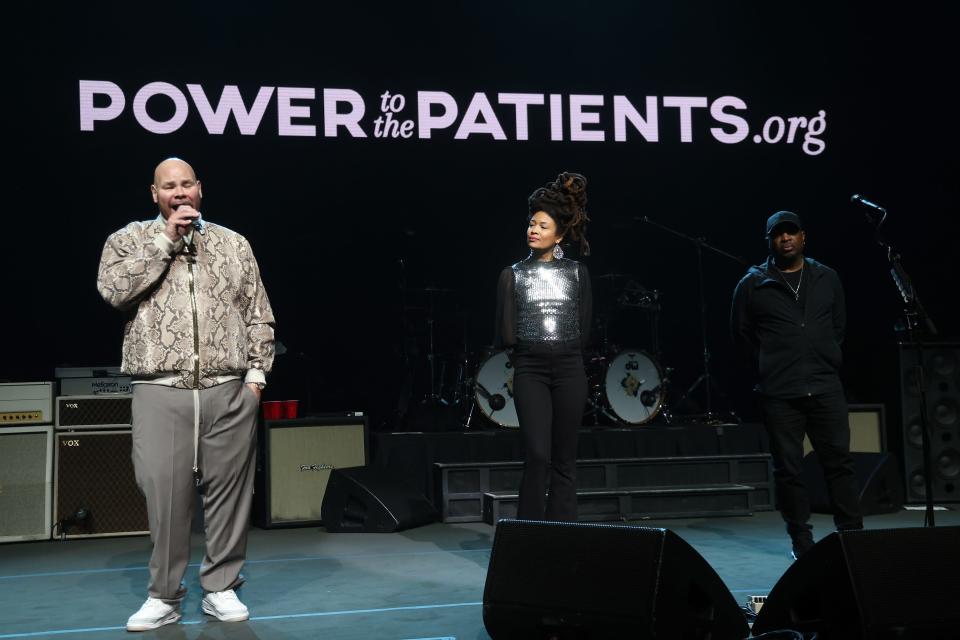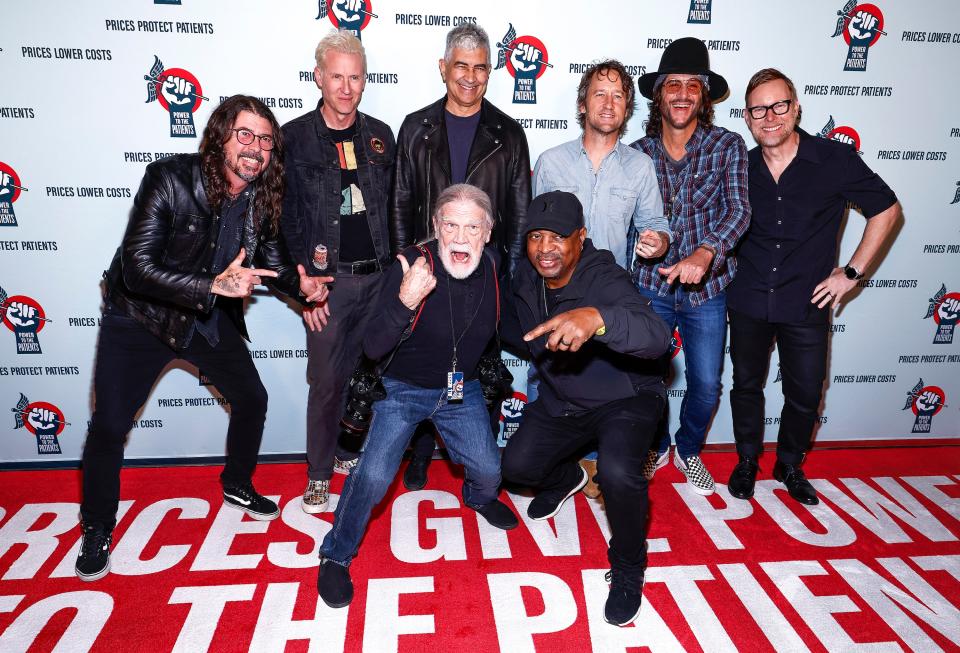Hip-hop legend Chuck D on advocating for healthcare price transparency

Chuck D of Public Enemy spoke to Business Insider about his work with the nonprofit group Power to the Patients.
On Tuesday, he joined Fat Joe and Foo Fighters in a Washington, DC, event to advocate for healthcare price transparency.
The event followed his participation in a September 2023 PSA from the organization.
On Tuesday, Chuck D of Public Enemy joined Fat Joe, Valerie June, and the Foo Fighters in a Washington, DC, event to advocate for greater price transparency in the US healthcare system.
Organized by the nonprofit group Power to the Patients, the event was the latest in a series of efforts from the group in partnership with musicians and saw the artists push for healthcare reform and perform before an audience of lawmakers and government officials.
Ahead of the event last week, Chuck D spoke to Business Insider in a phone interview about his ongoing advocacy work with the group, including his participation in a September 2023 PSA from the organization with Fat Joe, Method Man, Busta Rhymes, and other hip-hop artists.
Tuesday's event followed a similar event on Capitol Hill last month from Fat Joe, Jelly Roll, and Wyclef Jean, where the artists pushed for the passage of a standing bipartisan bill in the Senate that would strengthen and expand requirements for healthcare price transparency.
Last year, a report from the nonprofit group Patient Rights Advocate found that only 36% of 2,000 surveyed hospitals complied with a 2021 federal Hospital Price Transparency rule, while a recent Marist poll showed that 94% of Americans favor legislation that would require hospitals and insurance companies to disclose healthcare prices with greater transparency and accessibility.
This interview has been edited and condensed for clarity.
Appreciate you lending your voice to this, as I know Power to the Patients does. How did you get involved with the organization?
I was reached out to as they was trying to get the voice of hip hop, the voices of hip hop, to try to be that extra voice to get the importance of this across. It was a radical approach, because, in Hip Hop 50, there's still this sorta apprehension of like, "Why should they be speaking towards a scenario that's really, really important?" But then, I guess, greater minds prevailed and said, "Yeah, why not?"
You know, you got people who are now entering their 40s, 50s, and 60s, who are, if not themselves, their families immediately surrounding them are beleaguered with the same conditions and situations. So why not have a voice that actually is not only loud and relevant, but also speaking to the scenario that's taking place in their own lives? So I heard about it. I was reached out to, and I said, "Wow, it's an automatic-brainer."
And I was fortunate that they reached out to me, 'cause I had no idea. Like many things, you don't know what's going on, and there happens to always be a gap between the worlds, so to speak. The arts world, the business world, and the medicine world. They're like three worlds apart. So the wherewithal of this organization coming to try to combine the efforts of the voices and the personalities was something important to be commended here.
In the PSA you did last year, you called this issue "an American humanitarian crisis." How have you seen it manifest in your experience or in stories you've encountered?
I mean, all we gotta do is look at our own families. You know, if you're Black, and you're Black in the United States of America, you're immediately aware, if you wanna pay attention, to how the conditions and the costs are like two different worlds. And usually the costs are so astronomical that most people treat hospitals like they treat the police precinct. [Laugh]. Like, "Nah, I'm not going to that, because I know I'm going to get jerked in the end." So, we don't have to go far for our stories.
Even in hip hop, you have a massive amount of people. Since they're self-employed, a lot of people don't have insurance. This is one of the reasons that I got involved with The Hip Hop Alliance, the association with SAG-AFTRA in partnership, because artists and music artists and hip-hop artists, you know, largely never had insurance. So, if you don't have insurance immediately, you fall into the web of all the BS going on with the price differentials, and who's gonna do this for who, and how much it's gonna cost. 'Cause there's no transparency there.
You know, you posed a timeless question on the last Public Enemy records: "Can culture save humanity when the name of the game is narcissism?"
Yep.
In that vein, how are you viewing the prospect of legislative change ahead of this event?
Well, you have to view it like Dr. Martin Luther King, when he pressed America and said, "Listen, this is the United States of America. You can say all these things, but the effort gotta be what you guys claim to be on paper." And I think that we as a cultural community should always press the issue. Like, if you saying these things on paper, then what's to make you live up to these promises.
This is why the push is gonna be in government. You take it to government to pass the bill. You know, usually protest pops out of the fact that there's a ignorance and there's a deaf ear to what the issue and the problems are. So, these voices are trying to say, "Hey, let's talk about this, and doing it the right way, and doing it the just way. If there's justice for real." Great question, though.

What have you made of Fat Joe's work on this front?
Fat Joe, he's gotta be commended. You know, artists have the luxury to be whoever they wanna be at any given time. They don't really necessarily have to be accountable, 'cause people make their art pretty much for themselves. And then there's an industry that feels that they can make something out of it. But Fat Joe makes the effort. And Fat Joe has a lot of things that he's put out there, as far as content, that came through different stages of his life. Right now, Fat Joe, he makes no bones about it.
This is his stage of life now. This is the age that he's at right now, and he's speaking more truth to that power than any time before in his recording or personality career. So, the question is, "Will society have its ears open and its mind open to this level of progressive positivity by Fat Joe, more than when he decided to go into storytelling from a different realm?" You know what I'm saying? That's the challenge. Like, yeah, now, if these rappers are saying something very poignant and succinct to the point of a movement that makes sense, will the powers that be pay attention to the noise?

Where hip-hop is the voice of my generation and yours, Foo Fighters seem like a shrewd "reach across the aisle"-type appeal, in this instance.
Right.
[Laughs]. How are you looking forward to, uh, working with them?
David Grohl always makes an effort. Dave Grohl and the Foo Fighters come from a very punk, beginnings of rap, go-go background. So if anybody understands the soul of people ... and I've seen Dave Grohl, played with Dave Grohl in action. He's a hundred percent about it. There's not no fakery up in there. He ain't gotta do it.
Rock is way more organized than hip hop I think, 'cause the commercial organizes us by default. Anytime you have a lot of Black voices, you need it to be in, I think, a collective effort, as a united effort in one, to chart the foundations of hypocrisy. So, when you get a whole bunch of voices together as a collective, that's what they call a movement, right?
Whereas the world of rock, you know, maybe one rock voice can shake the rafters, because rock is very organized. For years, I've been wanting hip hop to be organized, but we're coming to that. That's why, you know, I'm a member of Hip Hop Alliance with Kurtis Blow, KRS-One, MC Lyte, and others that have fused our truth to power to our cultural personality and art.
The last Public Enemy record is a key piece of my recollection of the last election. Can we expect any kind of statement on wax from you in the lead-up to this next one here?
I think today people listen with their eyes. I released five art books last year with commentary that previously would've been bars on a record. We're in a different time now. I'll always make records. I have my own record label. I got projects with Def Jam, but you know, that's a fly in a big vat of buttermilk. So it's gonna take more, and I think the step to make the masters move was a collective in real places and spaces. And that commercial, in real places and spaces, whether it's on television, whether it's riding through everybody's DMs on social media, those are the musical efforts, the collective efforts, that will gain positive activity.
I think what I did 40 years ago was groundbreaking and pioneering because there wasn't nothing in our way of an obstacle to stop us. But 40 years later, that's not gonna be the major way that you make people think, I don't think. Nah. People pledge allegiance to their gadgets. You know, they pray to their machinery, and their social media pages. So you have to find other methods to penetrate that, with new human beings, too. I'm not saying don't make songs. I'm just saying that the realm of making a song in 2024, '25, is different than making a song in 1988.
Read the original article on Business Insider
